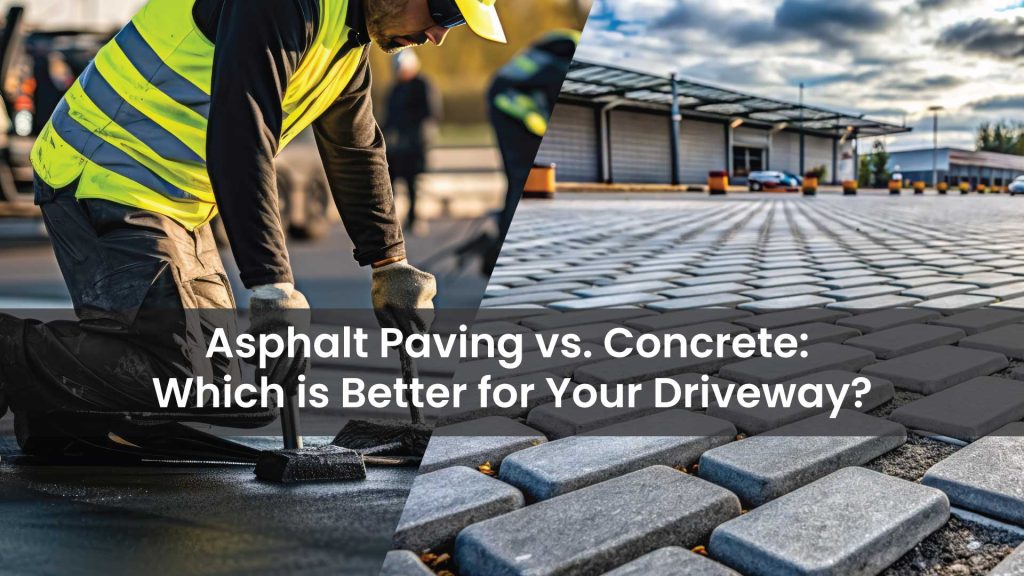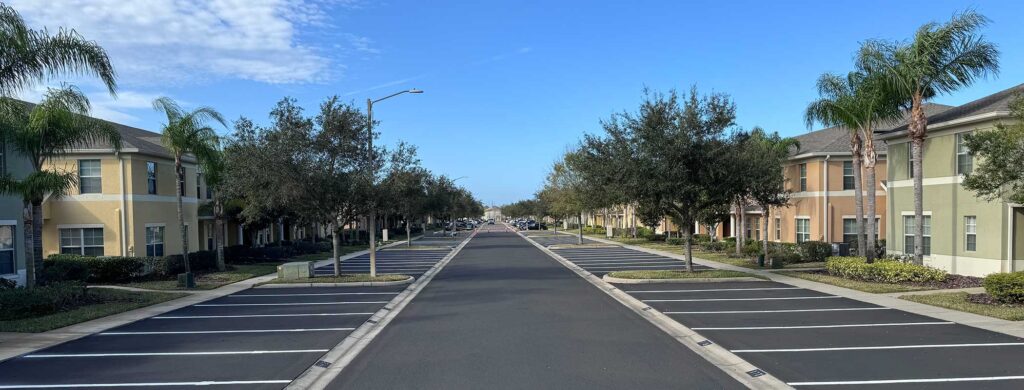If you are pondering over the selection of material to make your driveway narrowed down to asphalt paving and concrete. Each material comes with its own set of benefits, but which one is best for your driveway depends on the cost, maintenance, longevity and look you want. That is always the question, so in today’s blog we will discuss some of the main differences between asphalt and concrete to help you make an educated decision.
1. Cost comparison
Cost is definitely one of the biggest things to take into consideration when purchasing an inexpensive driveway material. Concrete can be expensive, but generally costlier than asphalt paving. It could cost up to 50% less than concrete for the initial installation, which can make this the perfect option based on your budget as a homeowner.
Conversely, concrete is generally a costlier material as it requires higher material and labor costs. Concrete, on the other hand, has a much longer lifespan, but because of its initial high cost, that is not always justifiable, as most people have to consider putting their budget in place.
Asphalt Paving: As far as the price goes, asphalt paving is more economical and offers the most attractive option for anyone looking to save some money whilst enhancing their driveway.
2. Installation Time
One of the greatest hallmarks of Asphalt paving is its ability to be installed very quickly. After the asphalt has been laid, it takes around 24-48 hours to cure: and within a few days, you can use your new driveway. The faster turn around time is what makes asphalt a better choice for new, or replaced driveway installations, as well as running a low amount of out-of-emergency patchwork and additional to private where-ability.
On the other hand, Concrete takes more time for curing. Concrete may require up to a week or more hardening time before it is ready for use. For time-sensitive projects, asphalt pavement is a quicker solution.
3. Durability and Longevity
When it comes to durability, both asphalt and concrete are strong, but each material handles different weather conditions differently. Asphalt is more flexible, allowing it to expand and contract with temperature changes. This makes asphalt less likely to crack in colder climates or areas that experience frequent freeze-thaw cycles.
Concrete is more rigid and can crack under extreme temperature fluctuations. However, it is highly durable in hot climates and can last up to 30 years or more with proper maintenance. Asphalt typically lasts between 15 to 20 years, but regular maintenance like sealcoating can extend its lifespan.
If you live in a colder climate with harsh winters, asphalt paving is often the better choice due to its flexibility.
4. Maintenance Requirements
Both asphalt and concrete driveways require maintenance, but the type and frequency of maintenance differ. Asphalt paving requires regular sealcoating every 2-3 years to protect the surface from cracks, water damage, and oxidation. Over time, asphalt may develop small cracks, but these can be easily repaired with crack filler or patching.
Concrete, while requiring less frequent maintenance, is harder to repair once damage occurs. Cracks in concrete are more difficult to fix, and repairs are often visible, which can affect the appearance of the driveway. Additionally, concrete is more prone to staining from oil or gasoline spills, requiring frequent cleaning to maintain its appearance.
For those looking for a low-maintenance option, asphalt paving is easier to repair and maintain over time.
5. Weather Resistance
Weather plays a significant role in how well your driveway holds up over time. Asphalt paving performs better in cold climates because of its ability to flex with temperature changes. In freezing weather, asphalt is less likely to crack compared to concrete.
Concrete, however, excels in hot climates. It can withstand higher temperatures without softening, making it a better option for areas with extreme heat. Asphalt can soften in hot weather, which may lead to minor surface distortions in areas with heavy vehicle traffic.
If you live in a region with freezing winters, asphalt paving is a better choice for your driveway. For hotter climates, concrete is the more suitable option.
6. Aesthetic Appeal
The appearance of your driveway can significantly impact your property’s curb appeal. Asphalt provides a smooth, sleek, and uniform black surface. While it doesn’t offer much variety in terms of design or color, it does create a clean and professional look.
Concrete, on the other hand, offers more design options. It can be stamped, colored, or textured to create a unique look that complements your home’s aesthetic. Concrete’s versatility makes it a popular choice for those looking to customize their driveway’s appearance.
If you’re focused on aesthetics and customization, concrete offers more options. But if a classic, simple look is what you’re after, asphalt paving delivers a polished finish.
7. Environmental Impact
When it comes to environmental impact, asphalt paving has an advantage. Asphalt is 100% recyclable, and old asphalt can be reused in new paving projects. The production process for asphalt is also more energy-efficient compared to concrete, making it a more eco-friendly choice.
Concrete, while durable, has a higher carbon footprint due to the energy-intensive production of cement, a key ingredient in concrete. Concrete’s longer lifespan does offset some of its environmental impact, but asphalt is generally considered the greener option.
If sustainability is a priority for you, asphalt paving is the more environmentally responsible choice.
8. Repair and Resurfacing
As driveways age, repairs may become necessary. Asphalt is easier and cheaper to repair than concrete. Cracks in asphalt can be filled or patched quickly, and resurfacing can extend its lifespan without the need for complete replacement.
Concrete is more challenging and expensive to repair. Cracks in concrete are more permanent, and any repair work is often visible, detracting from the overall appearance. If your concrete driveway develops significant damage, replacing the entire surface may be the only solution.
For cost-effective repairs, asphalt paving is the better option. Resurfacing is a simple way to refresh an asphalt driveway without starting from scratch.
9. Resale Value
While both asphalt and concrete can raise your property values, a concrete driveway is going to provide you with higher resale value overall because of its long lifespan and nicer looking appearance. Premium material A buyer’s selling point is obviously durability, and concrete exudes that vibe most of the time.
Yes, but asphalt is less costly to start and if maintained properly can increase the value of your property as well. A professionally maintained asphalt driveway that is free from cracks and properly sealed is your first shot in creating a good impression while increasing the overall visual appeal of your property.
Conclusion
The decision between asphalt paving and concrete for your driveway is based on budget, climate, the way you like to maintain your property, and how you want your driveway to look. Asphalt you may would think as your easier and more cost-effective option — which, yes that right…an asphalt drive is a little cheaper than other materials, and also just has a few hours of work to get flowing. It has relatively higher costs but is also somewhat more durable and versatile to beautify which recommended for a sunnier area, or if you are willing to spend the extra dollar in order to have an air of luxury.
Express Asphalt Solutions specializes in providing premier asphalt paving that is durable, cost-effective, and easy to install. Request Your Free Estimate Now, And Allow Us To Assist You With A New Construction Driveway At Your Home.
About the Author: Express Asphalt Solutions (EAS)
Express Asphalt Solutions is Florida’s trusted provider of high-quality asphalt solutions, specializing in paving services, sealcoating, and asphalt repair. Our expert team delivers durable, cost-effective solutions tailored to enhance the safety, functionality, and visual appeal of your driveways, parking lots, and commercial properties.
From precise asphalt paving and resurfacing to professional parking lot striping and long-lasting sealcoating, EAS ensures every project meets the highest industry standards. Whether you own a residential community, retail center, or commercial facility, our premium asphalt services provide long-term protection and superior curb appeal.
Experience the difference with Express Asphalt Solutions—where quality, efficiency, and customer satisfaction come first. Contact us today for a free quote and let us transform your pavement with expert craftsmanship!
See what our satisfied clients have to say here!
"*" indicates required fields




